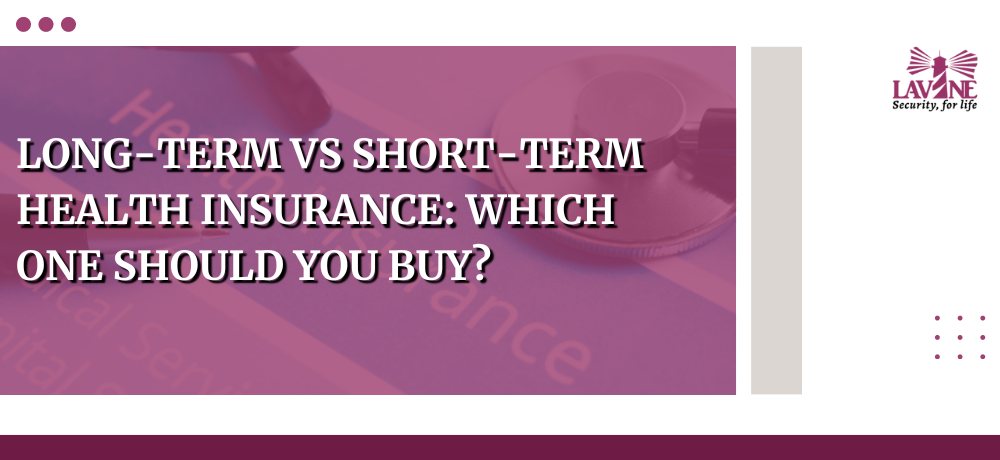
Long-Term vs Short-Term Health Insurance: Which One Should You Buy?
- Lavine LTC Benefits
Categories: caregiving , Homecareservices , nursing home
Choosing health insurance is a significant decision that requires careful consideration of your current needs, future plans, and budget. Two common options available are long-term and short-term health insurance. In this blog post, we'll explore the differences between these two types of coverage to help you make an informed decision.
Understanding Long-Term Health Insurance
Comprehensive Coverage:
Long-term health insurance, often known as major medical insurance, provides comprehensive coverage for an extended period. It typically includes benefits such as hospitalization, preventive care, prescription medications, and other essential health services.
Duration and Renewability:
Long-term health insurance plans are designed for extended coverage, often on an annual basis. They are renewable, allowing you to maintain coverage over an extended period, providing continuity for your healthcare needs.
Ideal for Stability:
Long-term health insurance is ideal for individuals or families seeking stability and consistent coverage. It offers peace of mind by ensuring ongoing access to a broad range of healthcare services.
Pros and Cons of Long-Term Health Insurance
Pros:
1. Comprehensive Coverage
Offers extensive coverage for a wide range of medical services.
2. Stability
Provides a consistent and reliable source of healthcare coverage over an extended period.
3. Preventive Care
Often includes coverage for preventive services and routine check-ups.
Cons:
1. Higher Premiums
Long-term health insurance typically comes with higher premiums compared to short-term plans.
2. Less Flexibility
May have less flexibility if your healthcare needs change during the coverage period.
Understanding Short-Term Health Insurance
Temporary Coverage
Short-term health insurance is designed to provide temporary coverage for individuals facing a gap in their insurance or during transitional periods. It is often used by those between jobs, waiting for employer-sponsored coverage, or seeking an affordable interim solution.
Duration and Flexibility
Short-term plans have a limited duration, usually ranging from a few months to a year. They offer flexibility, allowing individuals to choose coverage periods based on their specific needs.
Ideal for Transitions:
Short-term health insurance is well-suited for individuals in transitional phases, such as recent graduates, those changing jobs, or individuals waiting for Medicare eligibility.
Pros and Cons of Short-Term Health Insurance
Pros:
1. Affordability
Short-term plans often have lower premiums, making them more budget-friendly.
2. Flexibility
Ideal for individuals who need temporary coverage during transitional phases.
3. Quick Enrollment
Short-term plans can be quickly enrolled, providing rapid access to healthcare coverage.
Cons:
1. Limited Coverage
Short-term plans may have limited coverage compared to long-term options, excluding certain essential benefits.
2. No Pre-Existing Conditions
Short-term plans may not cover pre-existing conditions, limiting their suitability for individuals with ongoing health issues.
Choosing the Right Option for You
Consider Your Current Situation:
Evaluate your current circumstances, including your health status, anticipated healthcare needs, and any transitional phases you might be experiencing.
Future Plans:
Consider your long-term health goals and future plans. If you anticipate a stable period without major life changes, long-term health insurance may be a suitable choice.
Budget Constraints:
Examine your budget and financial constraints. Short-term plans may be more affordable in the short run, but long-term plans offer stability and comprehensive coverage.
Consult with an Advisor:
Seek advice from an insurance advisor who can help assess your individual needs and guide you toward the most suitable option.
The choice between long-term and short-term health insurance depends on your unique circumstances and preferences. Long-term insurance offers stability and comprehensive coverage, while short-term plans provide flexibility and affordability during transitional periods. Carefully evaluate your current and future healthcare needs to make an informed decision that aligns with your health and financial goals. If in doubt, consulting with an insurance professional can provide valuable insights tailored to your specific situation.
If you are looking for investments, then reach out to Lavine LTC Benefits. We understand the importance of securing your family's future, especially in Washington State and the West Coast. We specialize in offering life insurance that provides comprehensive coverage while being sensitive to your family's financial needs and protection.
Get in touch with us today
To learn more about what we do, please click here. To contact us, please click here or call us at (253) 275-6091.
